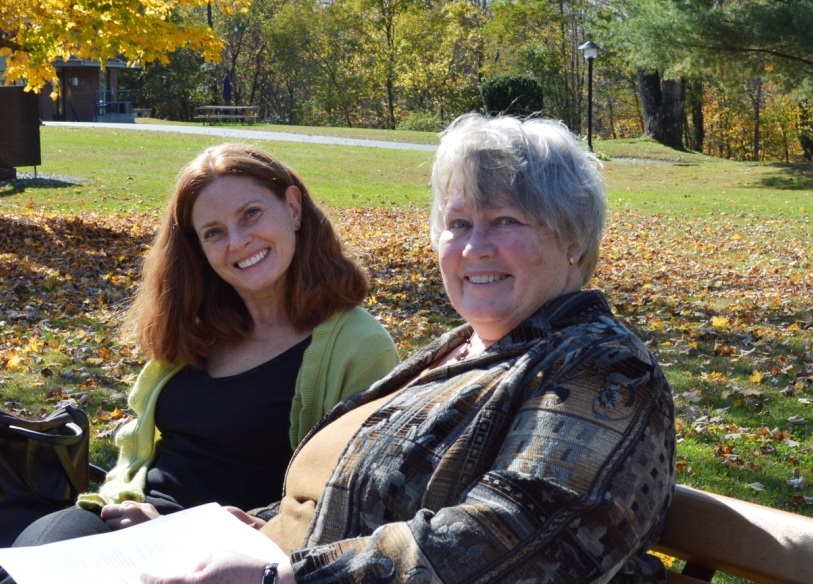Faculty Publish Prolifically in 2013
“Writing taps into my creativity and I love that.” – Janie Duncan, author of 10 language education publications, including a new book in 2013.
A handful of Landmark College faculty saw their scholarly work come to fruition in 2013. Janie Duncan, associate professor and chair of world languages, co-authored a book, and others published in educational venues.
Teaching Languages for Communication and Accuracy
Professor Janie L. Duncan published the third edition of Teaching Languages for Communication and Accuracy with co-author Raymond C. Clark in 2013. Duncan’s book is published by Pro Lingua, a Brattleboro, Vermont-based publishing house for books about teaching language that has been active for over 30 years and boasts 80 titles.
Teaching Languages for Communication and Accuracy is a user-friendly resource full of straightforward, fun strategies for language teachers. The practical approach is geared toward new teachers, but veteran teachers can also find creative lesson ideas and quick fixes in this language instruction tool kit.
“The techniques and tactics are fully part of my approach,” Duncan says. “Many came from v eteran teachers and colleagues; others, from conference presentations, webinars and professional journals. It’s important to be open to the needs of the learners and to know or devise an appropriate next step. It’s also important to adjust to the learning styles of individual students.”
eteran teachers and colleagues; others, from conference presentations, webinars and professional journals. It’s important to be open to the needs of the learners and to know or devise an appropriate next step. It’s also important to adjust to the learning styles of individual students.”
Teaching Languages for Communication and Accuracy is divided into two parts, one with longer lessons and the other with brief exercises. Part one, or “Techniques,” describes engaging lessons like “reader’s theater” and “storytelling” that can be completed in a 50-minute class period. In part 2, “Tactics,” instructors can find short exercises that address the common pronunciation, grammar, and vocabulary problems that students may face. Duncan explained that all activities are designed to have meaning for students while reinforcing core elements of language instruction. “Keep it real—that’s what we try to do in these exercises,” she said. “They have an element of mystery for students who must interact with one another to ‘solve’ the mystery.”
What’s next for Duncan? She’s thinking of writing a book about teaching languages to students who learn differently. When asked what the process is like, she said, “First I try to find out what is missing or what is needed. I might do this by consulting with a publisher or a publisher may contact me about a need they have identified. Researching what has been done already, talking with colleagues, editors and of course students about what would be helpful also guide me toward an outline. In general, my books and software follow a progression from concept to practice and finally to practical application."
Copies of Teaching Languages for Communication and Accuracy are available through Pro Lingua Associates, Brattleboro, Vt.
Faculty Articles
In other departments, faculty have written articles that focus on the education of college students who learn differently.
Ranging from the pedagogy of a climbing wall to the systematic unearthing of faculty perspectives on ASD, these articles are wide-ranging. However, they also share a key theme—they all document educational principles and practices that constitute the academic culture of Landmark College. That culture can be hard to see for those immersed in it, says Ken Gobbo, associate professor of psychology at Landmark College. “We live and work in a unique educational model,” says Gobbo. “Things we take for granted can be seen as innovative to outside audiences, thus our everyday ideas and strategies are valued.”
Publications from 2013 include:
Diverse and differently abled: Understanding the learning journey, by Associate Professor of Spanish Eve Leons, was published in The Language Educator, which is the American Council on Teaching Foreign Languages (ACTFL) journal.
"A way to promote student motivation and autonomy," by Associate Professor of First-Year Studies Sophie Dennis, appeared in The New England Journal of Higher Education.
"Climbing the walls: Adventure education in perspectives in learning," by Associate Professor of First-Year Studies Rebecca Matte, appeared in The New England Journal of Higher Education.
"Faculty experience with college students with ASD: A qualitative study of challenges and solutions," by Ken Gobbo and Solvegi Shmulsky, associate professors of psychology, was published in Focus on Autism and Other Developmental Disabilities, a Sage journal.
Aligned with Gobbo’s observation about the value of Landmark College educators’ insight, Professor Dennis shared this suggestion for interested writers, “Write about what you know—don’t overlook what you know. There’s a hunger out there for what we know at Landmark—you’ll feel confidence when publishers find value in your ideas.” By expressing their ideas in article form, these authors are spreading pedagogical insights to audiences outside the College, and thus furthering the mission to “transform the way students learn, educators teach, and the public thinks about education.”
Landmark College was the first institution of higher learning to pioneer college-level studies for students with dyslexia. Today Landmark College, offering two- and four-year degree options, a graduate-level certificate in universal design with technology integration, and summer programs for students who learn differently, is a global leader in integrated teaching methods for students with dyslexia and other learning disabilities, ADHD, and ASD. Students, faculty, and other professionals from all over the world are drawn to Landmark College for its innovative educational model—designed through research and practice to help all students who learn differently become confident, self-empowered, and independently successful learners.